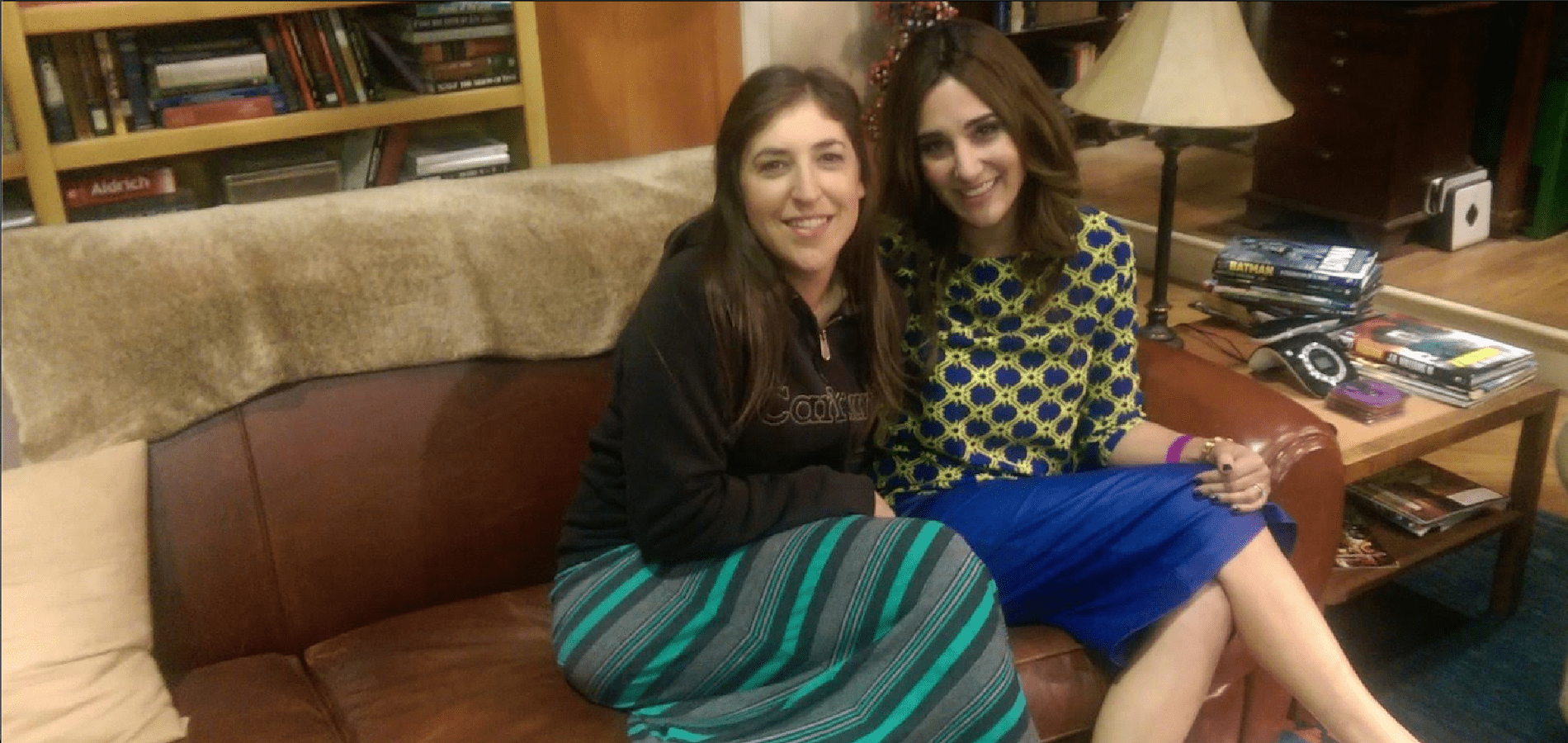
Exclusive Interview With Mayim Bialik On Being Most Observant Actress in Hollywood
Click here to listen to the complete interview from “Jew in the City Speaks,” part of The Nachum Segal Network. Shortened transcript below.
AJ: So, here you are – the show is over – you’re on the other side. What are the emotions of being a just few days out of this huge chapter of your life?
MB: I’ve been saying that I feel all the feelings. It’s very bitter-sweet to end an exceptionally long run on a television show, which as an actor, we so rarely get the opportunity to play one character for an extended period of time. So that is hard to say goodbye to. Obviously there is a comfort to knowing what you’re doing and doing it every week for nine years. So there is sadness and there is overwhelm. It’s also very exhausting to go through something like that publicly, with press interviews and social media, and there’s a lot of expectation of how people want me to feel or how they want us to feel. But there’s also a tremendous sense of, and I think this is very, very part of my Jewish sensibility, one door closes and another opens. And everything does happen for a reason and this is part of my journey. It’s not my entire journey.
AJ: Your faith in Hashem gives it more perspective this time. [As opposed to when Blossom ended.]
MB: Sure.
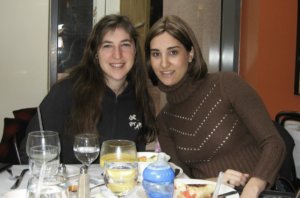 AJ: You’ve been in videos of ours, and you’ve really used your platform to get us out there. In fact, when people ask me how to grow an organization, I always say, “get a famous friend!” When we first started learning many years ago (when we were both young ladies!) I asked you “why did G-d make you famous?” and you told me at the time that you had never considered that before. So have you given that more thought since I asked the question?
AJ: You’ve been in videos of ours, and you’ve really used your platform to get us out there. In fact, when people ask me how to grow an organization, I always say, “get a famous friend!” When we first started learning many years ago (when we were both young ladies!) I asked you “why did G-d make you famous?” and you told me at the time that you had never considered that before. So have you given that more thought since I asked the question?
MB: Well, I think when you consider what my life was like when you and I met, and for people who don’t know, we were matched blindly through Partner’s in Torah, which is a learning organization where they pair people who want to learn about Judaism with someone who knows about Judaism. I had just had my first son, I was in graduate school, I had left the industry for twelve years, and my life was so different. I had been on Blossom, I had been on this show when I was a teenager, and I left the public world to really turn inward and become an academic.
So I was in such a different place in my life, and I guess when you ask me that, I didn’t feel that I was in a place to kind of have a platform. I really wasn’t planning on returning to acting, so I think that was part of it was that I just felt like a person, and I mean, to a large extent, I still just feel like a person. Meaning, we’re all wonderful people. But also, we’re insignificant in the scope of the universe. I think I felt that very strongly.
But ten years later my life is so different. And I have really enjoyed to work on a show like this – to be on the number one comedy in America is a very big deal. But I’m still a person inside, and there are still things that I want to do and ways that I want to achieve happiness outside of the scope of what people think of when they think of the Hollywood lifestyle. I’ve never been driven by money, by fame, that’s not really my shtick. I’m a performer. I’ve been a performer my whole life and I love entertaining people. That being said, being in a more prominent position publicly has allowed me to expand the scope of my Jewish presence, and that’s been very personally gratifying.
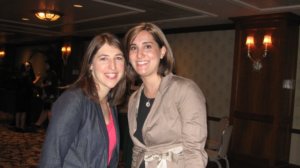 And I’ve also gotten a lot of wonderful feedback from Jews and non-Jews who are in some cases learning about religious Judaism for the first time and from a very different perspective. I wasn’t raised religious, I was raised with a lot of remnants of Orthodoxy because my mom was raised Orthodox, but I’ve been able to use, I hate the word platform, but I’ve been able to use my platform. I do a tremendous amount of advocacy work in the Jewish community, not just in Jew in the City. I speak for Jewish federations all over the world and I also really try and be a champion for celebrating aspects of Jewish identity that, as you do, to bring consciousness to that which has previously been misunderstood or misrepresented. I don’t know if that’s “why Hashem put me here” but I do know that we are all, we are all charged, Jews and non-Jews alike, to make the world a better place and to understand our place in the world as, you know, the people who didn’t create the world. You know, we are all, we are all in the same situation.
And I’ve also gotten a lot of wonderful feedback from Jews and non-Jews who are in some cases learning about religious Judaism for the first time and from a very different perspective. I wasn’t raised religious, I was raised with a lot of remnants of Orthodoxy because my mom was raised Orthodox, but I’ve been able to use, I hate the word platform, but I’ve been able to use my platform. I do a tremendous amount of advocacy work in the Jewish community, not just in Jew in the City. I speak for Jewish federations all over the world and I also really try and be a champion for celebrating aspects of Jewish identity that, as you do, to bring consciousness to that which has previously been misunderstood or misrepresented. I don’t know if that’s “why Hashem put me here” but I do know that we are all, we are all charged, Jews and non-Jews alike, to make the world a better place and to understand our place in the world as, you know, the people who didn’t create the world. You know, we are all, we are all in the same situation.
AJ: Partner’s with G-d to improve His world.
MB: Yeah, absolutely.
AJ: So you’ve been outspoken about being an observant Jew and in interviews said, “God isn’t such a popular word in Hollywood.” You’ve talked about modesty, Shabbos, mikvah. And while the show didn’t let you 100% observe in every way you wanted to, I think it is safe to say you are the most observant actress that Hollywood has ever seen. I know how impacted your fans are when you discuss these topics, but what about other members of Hollywood? Do you think anything you’ve ever spoken about has ever touched a chord with another celebrity?
MB: There is a certain comradery that I have found among Jews in the industry. And it is very rare to meet observant people, really even people with kind of a G-d consciousness. When I find those people in the industry, I cling to them because it’s both important personally, and I do find that it does add an element of perspective to my career. Our co-executive producer of Big Bang theory, Eric Kaplan, and I are very closely religiously and spiritually aligned for several years on Big Bang Theory. We had a weekly learning group. We learned with David Sacks, also a prominent entertainment person who is religious.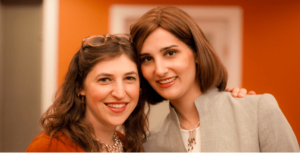
AJ: So, you mentioned that you had the chabura with Eric and David, and we also used to learn behind the scenes. I remember you were on Curb Your Enthusiasm, and we were learning Halachic Man at the time – a like totally common thing that people are learning in between takes!
MB: Of course, everybody studies Rav Solovetchik when they are on set!
AJ: And we also were learning a book on Shabbos while you were filming on Big Bang Theory.
MB: Right – we did the melachos of Shabbos.
AJ: How does it work to be an observant Jew in Hollywood when, frankly, there’s a lot of Jews there, but sometimes Jews are maybe less tolerant of Jewish observance. How are you able to carve out the observances that you were able to keep?
MB: Well you know, I credit Allison Josephs for teaching me how to do that, because I had to do it when I became religious. My parents raised me in a Reform synagogue, which I’m very grateful that they sent me anywhere. I was the kid who loved synagogue and when I became more observant, it was very hard for my parents. And in particular for my mom who likely had a lot of guilt maybe about not continuing to live an observant life. I was up against a lot of her preconceived notions and assumptions, really based on her childhood which did not represent all of Orthodoxy.
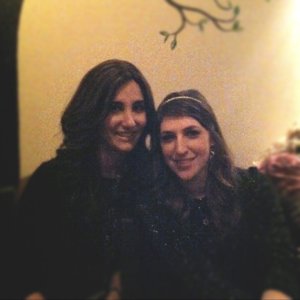 But I remember working through that with you, and that’s the same skills that I worked through when I encountered Jews in particular who really do have that kind of attitude of like “oh, you think you’re better?” “oh, you think you know more?” “you think you’ve got it figured out?” And you know, what I get to do is live a life of an example of what Torah living really looks like, and for me, the more learning I do and the more I ground myself in these kinds of principles the more compassionate I am, the more loving I am, the more I am encouraged to repair the world, meaning the more I put myself out there in the world and my feeling is that that speaks for itself.
But I remember working through that with you, and that’s the same skills that I worked through when I encountered Jews in particular who really do have that kind of attitude of like “oh, you think you’re better?” “oh, you think you know more?” “you think you’ve got it figured out?” And you know, what I get to do is live a life of an example of what Torah living really looks like, and for me, the more learning I do and the more I ground myself in these kinds of principles the more compassionate I am, the more loving I am, the more I am encouraged to repair the world, meaning the more I put myself out there in the world and my feeling is that that speaks for itself.
AJ: So the show never filmed on Shabbos, so you were off the hook for Shabbos most weeks?
MB: Right, we taped on Tuesday nights. Typically, sitcoms tape on either Tuesday night or Friday night. For many years of Blossom I taped on Friday nights. But I kind of got lucky in the sense that Shabbos was a non-issue. There are sometimes other work obligations that happen on Shabbos, which I mostly try to avoid, and I’m off social media on Shabbos. So, that’s something that gets put in contract if things that go over into Shabbos or sometimes social media campaigns have a certain day that something launches. If it happens to be on a sabbath, I can’t do that job or they need to know I can do it after sundown if they need something posted, even if I’m not actively posting. I don’t want my social media account being live on Shabbos.
But in terms of other yom tovim, again, other holidays that many Jews that I worked with didn’t even know about. Those are much more difficult to negotiate around. So I was always off for Rosh Hashana and for Yom Kippur, and that was part of my annual negotiation when we would pull out the Jewish calendar and it would be presented to Warner Brothers, and that was always protected, which I’m very grateful for. I did sometimes miss work on Yom Kippur but it was never a tape day, it always worked out that it was a day that I was given off or that I took off. Pesach is a little complicated because there’s two nights of seder, and I think there was one year when a seder fell on a tape night and I simply was not in that episode.
AJ: Wow. That’s amazing. You’re the Sandy Koufax of this generation!
MB: Oh yeah, that’s me.
AJ: It obviously takes a lot conviction to say I will go here, but here are my limits. You are really a trailblazer to have done this.
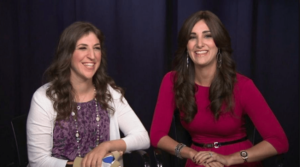 MB: I appreciate that, but I want to also acknowledge the people who don’t have that flexibility in their jobs. You know for people who are modern Orthodox and who are living in a secular world, it is a huge challenge. I’ve spoken to a lot of people who have a tremendous amount of conflict about that. So I don’t want to act like my case is normal because I know that I have is an exceptional situation, but the principle, I hope, you know even to have that consciousness I think is important. And so, when I did have to work on religious days of Sukkot or Shavuos or Shemini Atzeret or many of the other holidays that a lot of people don’t know about, I did. I would dress nicely, I would got to shul if I could before work or after work, and I would be off my computer and there were ways that I created my own concept of it being a special, holy day even though my life circumstances did not allow me to observe it the way I might have wanted to.
MB: I appreciate that, but I want to also acknowledge the people who don’t have that flexibility in their jobs. You know for people who are modern Orthodox and who are living in a secular world, it is a huge challenge. I’ve spoken to a lot of people who have a tremendous amount of conflict about that. So I don’t want to act like my case is normal because I know that I have is an exceptional situation, but the principle, I hope, you know even to have that consciousness I think is important. And so, when I did have to work on religious days of Sukkot or Shavuos or Shemini Atzeret or many of the other holidays that a lot of people don’t know about, I did. I would dress nicely, I would got to shul if I could before work or after work, and I would be off my computer and there were ways that I created my own concept of it being a special, holy day even though my life circumstances did not allow me to observe it the way I might have wanted to.
AJ: Right, and you wrote about that you had a driver that took you to work and opened up the car for you.
MB: Right.
AJ: Even if you couldn’t make the situation perfect for yourself (and we spoke about not rationalizing it but rather recognizing that you weren’t able to do it yet), I think what you really did is you moved the needle in Hollywood in terms of awareness.
MB: Thank you. I think also this feels like the right place to share something that I have not shared publicly yet. My father zichrono levracha, died four years ago and it was in the middle of work life. And I recited kaddish, for him for the full year of mourning.
My work days for that entire year on Big Bang Theory were preceded by often getting up at 5:30 in the morning to go to morning minyan. And I would often then go after work and there were some days when I couldn’t make it to all three services, but that was a huge part of my life. And my father’s yartzeit this year happened to fall on the last episode that we taped of The Big Bang Theory. And it was, obviously it was a religious holiday and we were on set at the time when ma’ariv fell (which is the final service). And I will not name names, but ten Jews on set many of whom had never done this, gathered in the hotel set where Sheldon and Amy had their final fight.
My ex-husband came, he brought my older son who is now counted in a minyan since he is thirteen, and I recited kaddish for my father on the set of The Big Bang Theory. It is a brief prayer, but it was so incredibly meaningful to have the people who I have worked with for ten years come together and represent with me as my minyan. I think it is probably going to be the moment that I remember the most. You know, my father used to come to set. People knew my dad. People knew when he died. I don’t hide my grief well. It was very, very holy and very complicated, but it was really beautiful. It was really really beautiful.
AJ: That’s gorgeous. Well, thank you for sharing that. That’s really lovely. Another thing that, I want to talk about, but I feel shallow for asking about your clothes after something so heavy and meaningful – Amy was a pretty tznius dresser because Mayim Bialik is a pretty tznius dresser, so how did that go about? 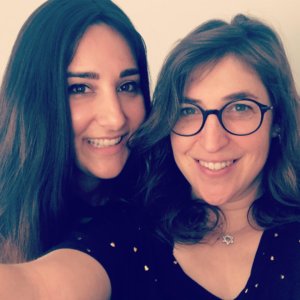
MB: Well, let’s see. I don’t wear pants outside of the house and that, I don’t know, you probably remember better than I do when I took that on.
AJ: We were learning about tznius early on and you told me you had a secret to tell me – that you had stopped wearing pants!
MB: Okay, so for about ten years let’s say, I have not worn pants outside the house. And when I went for my first fitting, for Amy, they presented some choices and I was like “ooo I like this skirt,”and I didn’t have kind of a significant conversation. When I was brought back in season four, there are obviously further fittings, and they presented some pants and I was like “so yeah, here’s the thing. I don’t wear pants” and she said “what do you mean?” And said I don’t wear pants, I’m like a Jewish lady that doesn’t wear pants. She kind of looked at me like “what are you talking about?” So, it became Amy’s look. Thankfully, we continued with skirts and the good thing on Big Bang Theory is that every character has a very specific wardrobe that they wear. The Smithsonian is actually going to be displaying all of our, traditional costumes, and yes Amy’s is a skirt.
There are a few exceptions. There was once a scene when there was a very specific joke about sweatpants. I think I called you about it, and they were baggy and there was a long shirt that covered my tush, which again, is not, that’s technically not my halachic sensibility, but it was a compromise for the purpose of this episode. There is also a paint ball episode where there is not a skirt option for paintball. So again, it was baggy and I had a baggy jacket over it. It’s been very interesting and we’ve even had many episodes of formal wear, and so they know that I don’t do sleeveless, I don’t do strapless. We always have like a cardigan over a sleeveless dress, that’s a thing. For the finale I had kind of a higher sleeve than I normally would wear. But it was feathery and I felt comfortable with it. And you know, we put many panels in dresses on Big Bang Theory to cover parts of me that I don’t want to show.
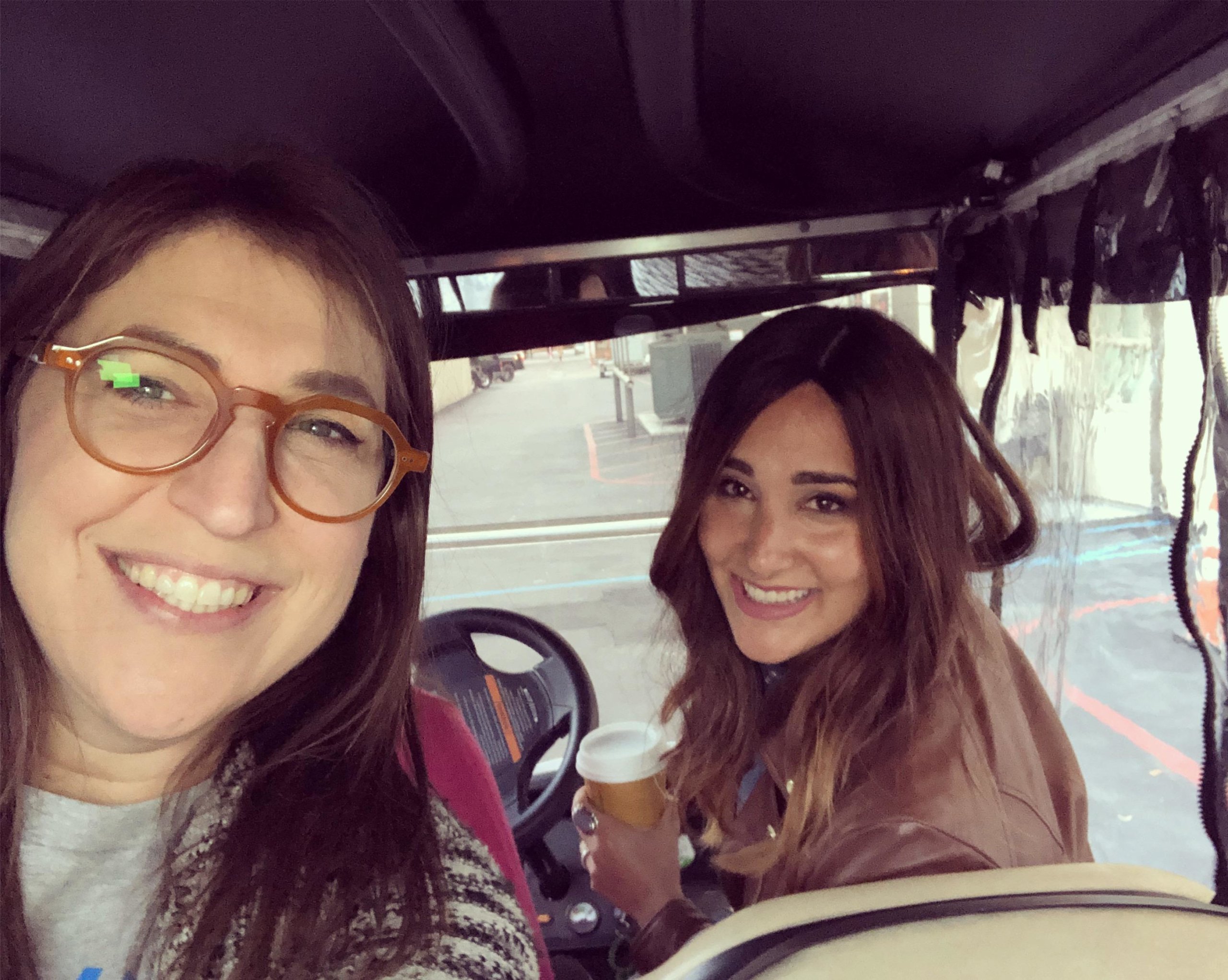 AJ: Literally, everyone in Hollywood cuts out fabric and you’re like “let’s add some more on.”
AJ: Literally, everyone in Hollywood cuts out fabric and you’re like “let’s add some more on.”
MB: Right, well I gather all the fabric that they cut out!
AJ: Modesty is so in right now, and I feel like you really started this trend, like it really –
MB: No, I don’t if I started this trend. I think that trends go up and down, but I think it’s important to point out, there are ways to be attractive and not have to show everything. And I think that is a lot more part of our sensibility now. Obviously with the Me Too movement we have to be so careful because there is absolutely no excuse for anyone touching you, making comments, anything like that. But for those of us who feel more comfortable with kind of less showing, I think it’s really important to realize that there are ways to do that and to look the way you want. And that really is the ultimate aspect of Orthodox feminism – feeling empowered by the way you dress in a way that makes you feel confident and good about yourself.
AJ: I don’t know if you saw this article we did. This young singer said that she likes to wear baggier clothes because she doesn’t want her body to be a conversation. And I think that that is exactly the point that you’ve always tried to make – that we try to make in Jew in the city. “Talk about my ideas and my talents and my personality and not what’s under my clothing.” I think that is part of the Me Too movement. Not to blame or shame, but just let’s move the conversation away to the parts of me that are lasting and really capture my essence. So, for whatever part we can credit you for, I believe you have brought these values consciousness to the world at large and to the world of Hollywood. It’s been an incredible and historic run, Mayim Bialik. I know this will not be the end. I’m sure there’s going to be some exciting things up next. Thank you for sharing this story with us.
MB: Thank you. And thank you again for your inspiration because it’s been a huge part of my journey, so thank you so much, and for what you do for the Jewish community at large.
AJ: Couldn’t do it without you.
If you found this content meaningful and want to help further our mission through our Keter, Makom, and Tikun branches, please consider becoming a Change Maker today.




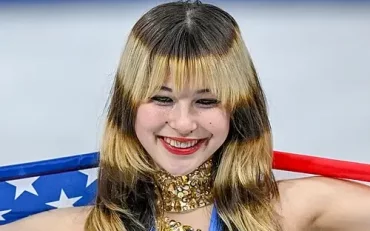



1 comment
Sort by
What a kiddush Hashem! (You, too, Allison)